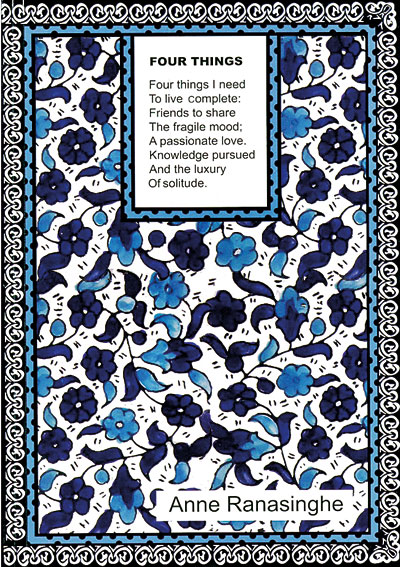Stone and Words: Indestructible, beautiful homage to poetry
 Stone and Words – both things are intertwined mottos in Anne Ranasinghe’s moving poem “The Song Has Died From The Lips Of The King”.
Stone and Words – both things are intertwined mottos in Anne Ranasinghe’s moving poem “The Song Has Died From The Lips Of The King”.
Stone: only stone escaped and survived the fire of destruction, as in the case of the burning down by the Nazis of the big synagogue in the city of Essen, Germany, where Anne lived during her childhood. “Only the stone remains. It did not burn.”
As for the words, they are part of an immaterial testimony and they irremediably crimp the memory into the stone. “Memory / With the reality of stone”
Four Things is Anne Ranasinghe’s latest published book. It was released in 2016 following the bestowal of the Cross of the Order of Merit of the Federal Republic of Germany at the occasion of Anne’s 90th birthday under the auspices of the German embassy. Now this book is a particularly beautiful thing by itself as a homage to Anne’s poetical work.
The book includes several German translations of Anne’s poems, which were originally written in English, her adoptive language. This comes as a due return after Anne’s loss of her mother-tongue, German, one of the finest European languages for expressing poetry and philosophy before the advent of Nazism. As Anne once wrote: “Not only had the Nazis killed all my family, destroyed my childhood, deprived me of my country, home and possessions and severed my roots – but they had also robbed me of my language.”
This is a book like a stone: heavy and thick like a tile. At first glance it looks like a ceramic tilework adorned with vegetal patterns, all blue-tinted friezes, somehow reminiscent of the azulejos, of Arabian origin which adorned palaces in Portugal and Spain at the height of their cultural glory inherited from the Arab domination when Muslims, Jews and Christians could efficiently develop knowledge, science and art in unity beyond the religions.
This floral motif also brings to mind the Dutch ceramic painting of vases, plates and dishes – all in an identically blue tone. On the other hand similar tilework echoes all those sorts of mosaics, ornaments, bronze plaques, “glowing coloured glass, from floor to ceiling, /Depicting both custom and Jewish tradition” – all which had been melted or shattered during the Night of the Broken Glass in 1938 in Germany when synagogues were destroyed by fire and by hatred. Anne Ranasinghe was 13 years old, hiding with fear in her home.
This is a book like a stone: the title refers to “four things” – but these things, unlike stone, are as immaterial as poetry, the essence of a complete life, is immaterial and can survive the physical destruction. Poetry remains – it does not burn – whatever the fate of material things.
The “four things” referred to in the title are drawn from lines by Anne herself:
“Four things I need
To live complete:
Friends to share
The fragile mood;
A passionate love.
Knowledge pursued
And the luxury
Of solitude.”
The book includes a wide selection of Anne’s poems published over the past 45 years. Sometimes the order of publication of the poems is rearranged according to the theme, e.g. Holocaust-related poems are all regrouped in the very first part.
Some poems, which seem essential in my opinion, are missing, such as “On finding the grave of my grandparents in Germany” from Anne’s most beautiful collection “Not Even Shadows”.
The book also includes the complete series constituting “On the Fifth Day”(2006) with the original and beautiful colour illustrations by Katrin Ehrlich.
Anne happened several times to write a poem after a painting or a visual. We remember Chagall’s paintings which celebrate buildings while we see in the same space of the canvas men and asses flying in the sky over the buildings and the villages – like Words hovering over the Stone. Similar to Chagall’s paintings, Anne’s poetry hovers over the materiality of things. Her poetry remains, and is still, always beautiful. This is a book which is a pleasure to read, and this pleasure is intensified by the pleasure of weighing it with both hands like an engraved stone. Like memory made material.
Four Things, by Anne Ranasinghe, 2016, 270 pages is available at leading bookshops.


